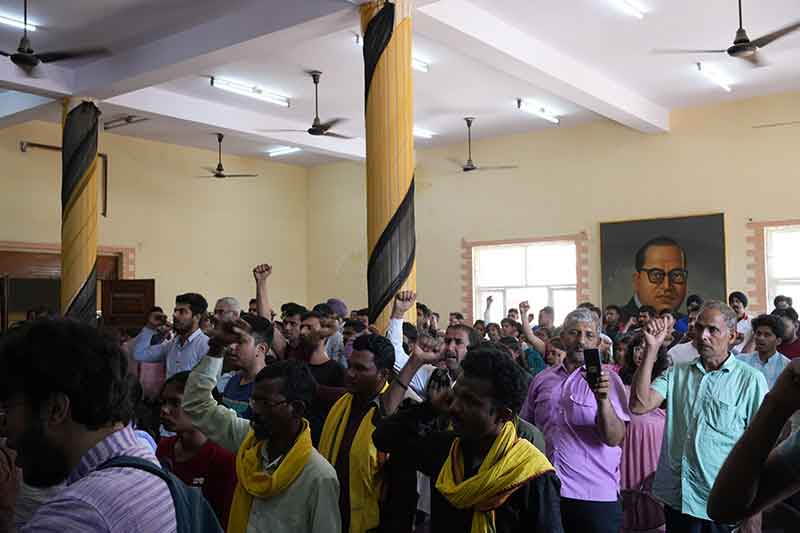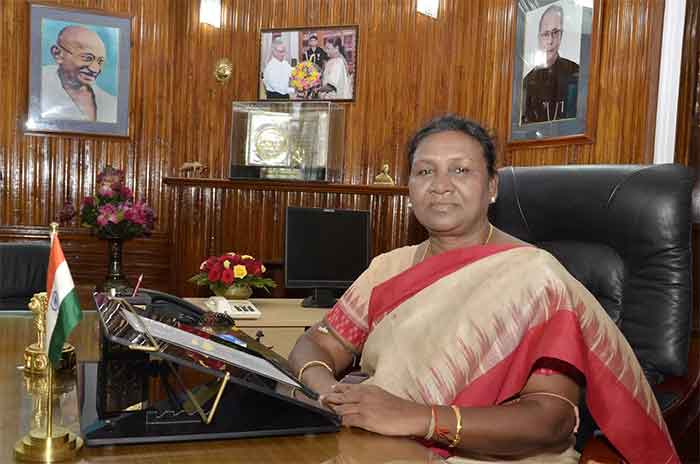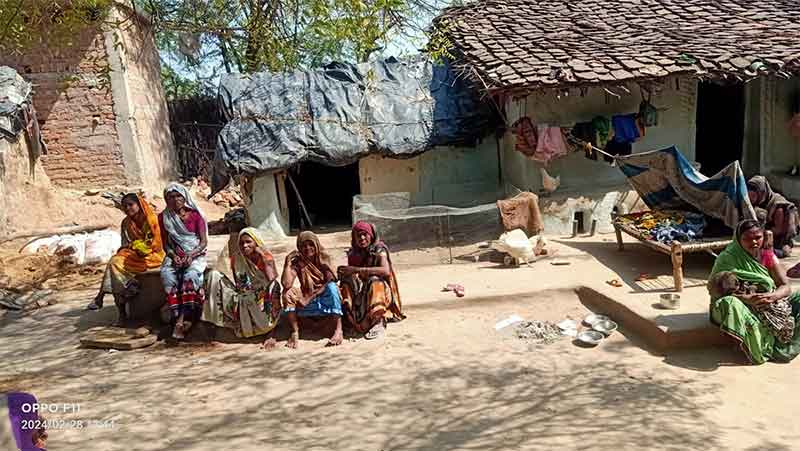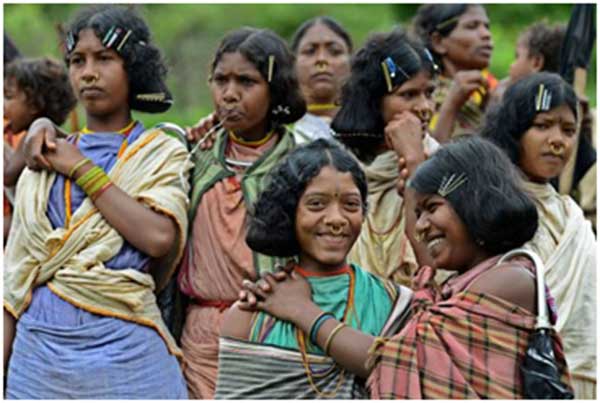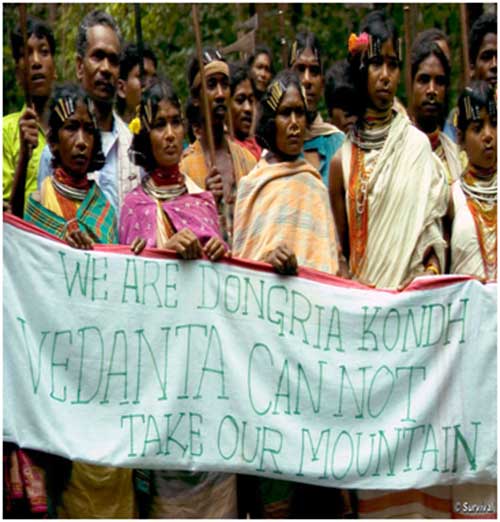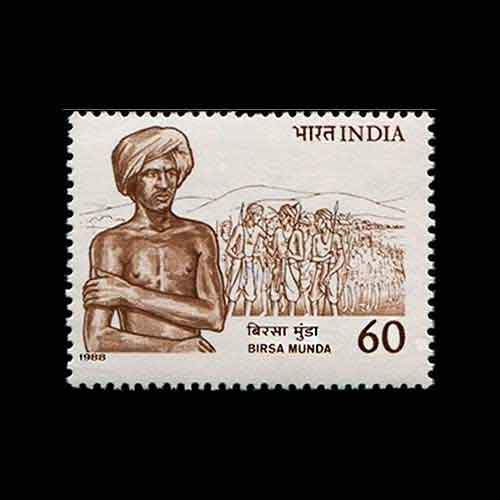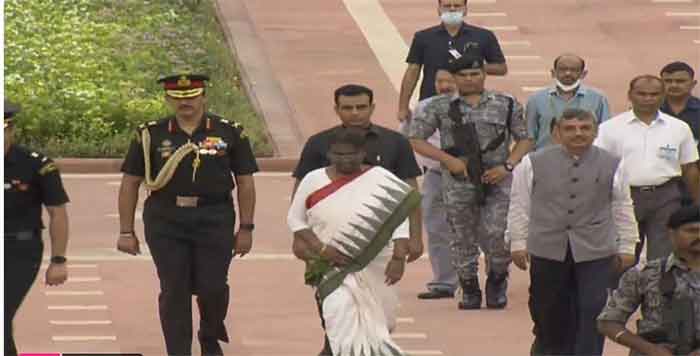
After taking the oath of office of the President of India, Droupadi Murmu said: “My election is proof of the fact that the poor in India can have dreams and fulfil them too.” Her speech at the oath taking ceremony was a moving narrative, recalling her past struggles from humble origins and her daily toil during her childhood. She described her journey to reach the present position of the President of India, as an illustration of “the power of our democracy that a daughter born in a poor house…born in a remote tribal area, can reach the highest constitutional post of India.”
No wonder that her own people, the Adivasis from various tribal communities, ranging from her home state Orissa to Chhattisgarh and other areas celebrated her appointment to this topmost post by coming out in the streets beating drums and dancing – as we saw in newspaper pictures and TV shows.
But her election as a President has much wider implications, as evident from the glowing congratulatory messages to her that have poured in not only from all political parties within India, but from leaders across the world including Russian President Vladimir Putin, and even President Xi Jinping of China, with which state India has a rather confrontationist relationship.
One has to admit that in a master stroke, Narendra Modi (or whoever his advisors may be) has managed to neutralize global human rights organizations who had been exposing the oppression of tribal communities under his regime all these years – several cases of such atrocities having been reported in Indian and international media, which drew condemnation even from the UN Human Rights Commission. By getting Droupadi Murmu elected as the President of India, Narendra Modi has killed two birds with one stone.
First, within India, Droupadi Murmu’s election has pacified the critics and protestors among her own Santhal community and other Adivasi groups, who have been complaining about discrimination against them. Narendra Modi is trumpeting her nomination and election as a demonstration of his affection for the downtrodden Adivasis. Secondly, in the international arena, he can now project Droupadi Murmu as a representative of his pro-tribal image – to disarm his critics in the UN Human Rights Commission and other global organizations which had been exposing cases of atrocities on tribals in India all these years.
Some uncomfortable questions
But in the midst of the current euphoria over the election of our new President, we tend to forget that she will have to face challenges from a ruling establishment that had always frustrated `the dreams of the poor,’ and continues to do so under the Modi regime – the same regime which has paved her way to Raj Bhavan.
This raises some fundamental questions relating to the method of implementing our constitutional policy of reservation for the deprived Dalit and Adivasi communities, that is meant to enable all their members to share equality and common benefits with other communities. In accordance with our laws that have fixed quotas for reservation of members of these Scheduled Castes and Scheduled Tribes, select number of candidates from these communities are nominated by political party leaders (for positions in legislatures) and appointed by administrators (for posts in the bureaucracy). But such electoral nominations and administrative appointments of candidates from these communities quite often depend on the individual preferences and choices of their political patrons in the first case, and on similar preferences of their employers in the administrative field in the second case. In the current political scenario, proximity to the higher caste Hindu patrons of the ruling BJP government, enables this new generation of SC and ST leaders to climb up the ladder in their political careers, as well as steadily accumulate and increase their personal assets – both movable and immovable. This may explain why some upwardly mobile Dalit and Adivasi politicians are joining the ruling BJP, which is in a better position than other parties to offer them these opportunities. A few may also drift towards the ruling party to protect themselves from persecution for their past misdeeds – like a Punjab Dalit leader whose name figured in a 2014 ED (Enforcement Department) probe in a drug racket case, and who later joined the BJP in 2021, obviously expecting that the ruling party’s hand maiden ED would drop the case.
But the incorporation of a few such ambitious leaders from these two communities into the folds of the ruling BJP, and the appointment of some of them as ministers in BJP-ruled state governments, have made no difference to the plight of the vast masses of Dalit and Adivasi poor who continue to suffer from exploitation by the upper classes and oppression by the state administrators. These leaders, after having captured privileged posts, shut their eyes to avoid witnessing the daily scenes of atrocities that their communities suffer, and plug their ears to refuse to hear the voices of protest raised by them.
Betrayal of Adivasis by BJP tribal leaders
A devastating report has come out exposing the criminal negligence of the welfare of Adivasis and their oppression in BJP-ruled states. The Adivasi politicians, who support the BJP and who are members of these BJP-run governments, cannot escape the responsibility of acquiescing in the crimes that are being perpetuated against members of their own communities in these states.
Compiled by Subodh Varma and entitled `India’s BJP’s poor record in tribal welfare,’ it was carried by the news portal `people’s dispatch’ on July 27, 2022 . Examining the plight of Adivasis in the BJP-ruled states of Himachal Pradesh, Uttar Pradesh, Madhya Pradesh, Gujarat and Maharashtra (where tribals constitute a significant proportion of the population), the report reveals three major lacunae in the policies that are being followed and implemented by these state governments.
First, regarding the granting of land titles to tribal forest dwellers under FRA (Forest Rights Act), they have lagged behind other states. This means that the tribal farmers tilling forest lands in these areas are denied any legal right to their traditional agricultural resources. As a result, they are being dispossessed of these resources and evicted – with the help of local officials – by commercial interests which are encroaching upon their traditional possessions to set up business enterprises.
Secondly, coming to the 2022 budget allocation of funds for scholarships and vocational training for SC and ST people, these BJP-ruled states have failed to meet their demands. They have ignored the guidelines that were laid down by Niti Ayog in 2017, according to which they were required to reserve 15.49% of their budget for SC people, and 8.2% for STs. Very few from among these under-privileged communities in these states have been able to avail of the rights and facilities that are guaranteed to them by the Indian Constitution, as well as the newly introduced quota system. Every time they try to assert their rights, they are attacked by their upper caste neighbours and persecuted by the local police (who mostly belong to the same upper castes).
Thirdly, what is of utmost concern is the case of increasing atrocities against Adivasis. According to the National Crime Records Bureau report of 2020, the number of such atrocities rose from 6,573 in 2016 to 8,272 in 2020.
Rights of Dalits reduced to grudging concessions
When we turn our attention to Dalits, we find that despite the various laws that are meant to protect them from discriminatory practices like untouchability, reports keep pouring in the media every day about their being denied access to village common water sources, meals cooked by them in schools being rejected by upper caste students, some of them even being beaten up for innocuous festive display like riding a horse to celebrate a wedding – a custom that is meant to be a reserve only for the Hindu upper caste bridegrooms in the Hindu-Hindi heartland ! In such cases of blatant violation of laws, the local administration remains an idle spectator, and even worse, often allows the police to persecute Dalits who dare to protest.
Even in government offices, the few Dalits who have been able to secure jobs are usually treated by their upper caste and upper class colleagues and bosses with dismissive gestures of grudgingly tolerating them – humiliating them by reminding them always that they got the jobs due to the `quota’ reserved for them, rather than their merits. There are allegations of their using abusive terms against them,and even resorting to the obnoxious habit of treating them as untouchables.
According to the latest official figures, there were 1,38,825 cases of atrocities against Dalits over the three years between 2018 and 2020. (Re: Union Minister Ramdas Ahawale’s statement in Parliament on March 22, 2022). Let us remember that these atrocities took place during the tenure of a Dalit President – Ram Nath Kovind, who has just retired to make way for his successor, the Adivasi President Droupadi Murmu.
Will, and can President Droupadi Murmu reverse the prevalent anti-Adivasi and anti-Dalit trends in our society and administration ?
Given the ground reality that is described above, we are nagged by uncomfortable doubts expressed earlier in this article. Can a President, nominated and elected by a ruling party through a majority of votes that it can garner (as happened in the present case), instead of a candidate elected by common consent by both the ruling party and the Opposition, enjoy the trust of all the classes of the Indian people, cutting across party lines ? To put it in blunt terms, will she dare to confront and challenge the prevalent order (both social and judicial), under which upper class and upper caste people can get away despite atrocities that they commit against Adivasis, Dalits and minorities, while members of these communities are persecuted for asserting their rights on their forest lands, rights for access to common water sources, rights for their food choices (like consumption of beef) – all happening under the patronage of a government headed by a party to which she belonged just some months ago ?
Another disturbing question: – will all the poor that Droupadi Murmu claims to represent be able to approach her office in Raj Bhavan and demand redress of their grievances ? Most of these grievances are articulated by members of her own Adivasi community, who are being ousted from their forest homelands by powerful industrial and commercial houses which want to exploit the mineral resources there to set up industrial and mining establishments. These industrial houses are being patronized by the same BJP ruling party that has elevated Droupadi Murmu to the present position. Will she listen to the voices from the aggrieved people of both her community and other poor sections and assert her discretionary powers to redress their grievances, or will she reduce herself to the status of a rubber-stamp representative of the ruling party by complying with its demands ?
Facing Centre-State conflicts
Apart from that challenge of meeting the demands of her own community and other under-privileged groups, Droupadi Murmu during her tenure as a President, will also have to remove the suspicion that she might be serving the partisan interests of the ruling BJP (of which she was a member till recently). She will have to prove her credentials as an impartial arbiter over disputes that are increasingly arising between the ruling party at the Centre and the Opposition parties and the non-BJP ruled states. Let us see how she acts in such cases – whether as a rubber-stamp President, like Fakhruddin Ali Ahmed who stamped on Indira Gandhi’s order of Emergency in 1975, or a self-asserting President like R. K. Narayanan (who incidentally came from the oppressed Dalit community), who used his discretionary powers during 1997-2002, to uphold the Constitution by taking steps that often went against the wishes of the ruling politicians. In 1997 for instance, he dissolved a hung Lok Sabha after consultations across the political spectrum, since no party was in a position to secure the confidence of the house. Again in May 1999, he prevailed upon the then prime minister A.B. Vajpayee to convene a special session of the Rajya Sabha, in order to concede to the Opposition parties’ demand for a debate on the Kargil War.
It is yet to be seen whether President Droupadi Murmu chooses Fakhruddin Ali Ahmed or K.R. Narayanan as her role model from the list of her predecessors.
BJP strategy to co-opt the sub-elite from Dalits and Adivasis
Meanwhile, let us examine the motives behind BJP’s sudden decision to select a little-known Droupadi Murmu as a Presidential candidate – superseding the other better-known aspirants from the Sangh Parivar, who were expecting the nomination for their life-long dedication to the cause of Hindutva. It is a calculated move to woo the Adivasi communities at a time when they are increasingly feeling hostile towards the BJP regime. During the last decade and more of BJP rule, thousands of Adivasis had been ousted from their forest lands to make way for industrial and mining projects which were sponsored by the BJP, both from the Centre and the states that it ruled. In a public gesture of a symbolic compensation for their economic losses, the BJP rulers are now promoting one from their Adivasi community to the top most post. They want to neutralize these Adivasis (hitherto aggressive in asserting their demands), and reduce them to the role of passive supplicants for social and economic benefits from a benevolent President who has been nominated from their community. This is not a new BJP game plan. Five years ago, it picked up a leader from the Dalit people – Ram Nath Kovind – and succeeded in getting him elected as a President. The BJP’s choice of these two individuals as candidates for the Presidential elections – the first in 2017, and the second now in 2022 – is a part of its strategy of recruiting members from the upper class segments of these communities. During the last few decades, a new class of Dalits and Adivasis has emerged on the Indian political and social scene, who can be described as an upwardly mobile sub-elite from among these communities, and who wield considerable influence on their respective vote banks. Both Ram Nath Kovind and Droupadi Murmu – as their bio-data reveal – represent this class. They had to go through arduous struggles to enter the club of the ruling elite and establish themselves as representatives of their respective communities, whose support the political elite needed to win votes and get elected.
The sub-elite class from Dalit and Adivasi communities
It may be interesting to take a look at and examine the traits of this new class that has emerged from among the Dalit and Adivasis during the last few decades. Its members have acquired leverage in both the political scene, and to some extent in certain segments of the economic scene. The Dalit entrepreneurs have been able to set up the Dalit Indian Chamber of Commerce and Industry, which claims a large membership from commercial and business enterprises. More importantly, in the political scenario we find Dalit leaders who play a decisive role in the formation of governments in some states, and in asserting their presence in the Centre.
Similarly, a new generation of Adivasi leaders has arisen on the political scene who are re-shaping the contours of the map of India. Due to their agitation, two new states have been carved out in central India based on tribal identities – Jharkhand and Chhattisgarh. In the north-east, the different tribal groups had been already enjoying for many years statehoods, based on their separate identities.
But judging by reports of the performances of these sub-elite Adivasi political leaders who are ruling these states, we find that they are replicating the same model of corruption and criminalization – a model that had been framed and institutionalized by the upper caste ruling powers that had exploited and oppressed them in the past, and are patronizing them now. They are following the path set by their Dalit predecessor Mayavati, who after coming to power in Uttar Pradesh, spent more money on projecting her personal image through statues, and acquiring personal assets, instead of taking measures to improve the lot of her own Dalit community, which remained as impoverished and exploited under her rule, as in the past.
Are sub-elite Dalit and Adivasi leaders of India turning into `Uncle Toms and Aunties’ ?
The term `Uncle Tom’ is a pejorative word used in the US for African-American politicians who, in order to gain entry into the mainstream White-dominated power elite, prefer to remain silent about the grievances and demands of the poor people from their own community, and instead grovel before the decision-makers of White House (note the adjective `White’ that is used to describe the US centre of power !). They appease the ruling parties by acquiescing in their aggressive foreign policies, in order to carve out and preserve places for themselves in the political establishment. Typically, they come from a privileged class of the Black community, who during the several last decades have been beneficiaries of the US government’s `affirmative action programme’ (which consists of a set of laws, policies and guidelines allowing racial minorities access to education and employment – much like the Indian government’s reservation policies for SC and ST minorities).
Leading among such `Uncle Toms’ in the US was Colin Powell, who as the Secretary of State from 2001 to 2005, pushed the then President Bush’s agenda of invading Iraq in 2003 – on a false excuse which led to disastrous consequences. His successor was another Black politician who could be described as an `Aunty Tom’ (to slightly change the term according to the gender difference ! ). She was Condoleezza Rice, who was earlier the national security advisor for Bush and who continued to follow the same aggressive foreign policy of the Bush administration all through her tenure from 2005 to 2009, acquiescing in the war against the people of Iraq. The most successful `Uncle Tom’ was the suave and ever-smiling President Barrack Obama – who kept alive the tradition of US aggression on foreign lands in the name of `regime change to establish democracy’ in those lands ! He ordered his army to invade Libya in 2011 to overthrow its ruler Muammar Gaddafi.
These `Uncle Toms and Aunties’ are looked down with contempt and hatred by their own African-American community and intellectuals in the US. The famous Black singer and actor Harry Belafonte once described them as “black tyrants.”
Coming down to the present times in India, we earnestly hope that our Dalit and Adivasi leaders who are occupying important positions, both at the Centre and in the states, do not turn themselves into Indian replicas of the selfish and ambitious Black sub-elite politicians of the US – who have betrayed their own people.
Sumanta Banerjee is a political commentator and writer, is the author of In The Wake of Naxalbari’ (1980 and 2008); The Parlour and the Streets: Elite and Popular Culture in Nineteenth Century Calcutta (1989) and ‘Memoirs of Roads: Calcutta from Colonial Urbanization to Global Modernization.’ (2016).

